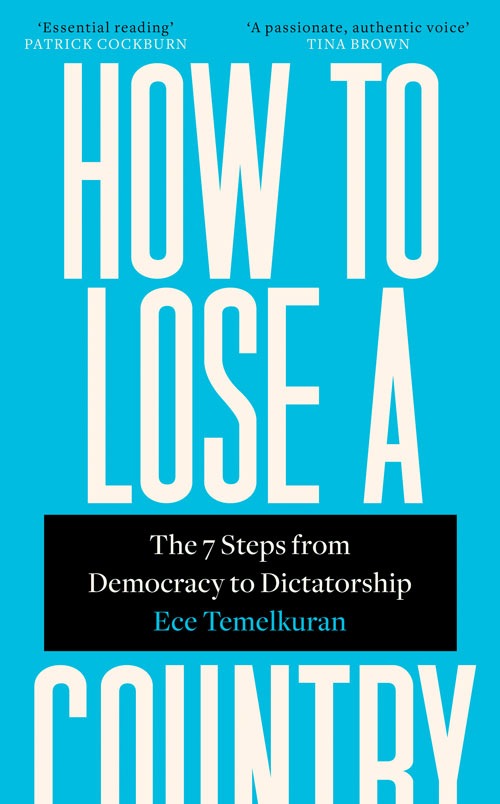
Ece Temelkuran is one of Turkey’s best known political commentators and a prominent critic of the Turkish government. Her latest book "How to Lose a Country: The 7 Steps from Democracy to Dictatorship" (Fourth Estate) is written as a warning that populism and nationalism don’t march fully-formed into government; they creep, following a remarkably similar pattern around the world. Here, she discusses her arguments..
Why did you decide to write this book?
It was impossible not to write this book given what’s happening in European countries and the USA, and the striking similarities with what had happened in Turkey. I believe that fight with populism cannot be on a national level – we need international solidarity to reverse this global political current. To do this I wanted to reveal the main mechanisms operating behind national political insanities. Though every nation has its own unique conditions and specific background, these patterns operate exactly the same way in each country.
What can western countries learn from the Turkish experience?
It took over a decade for Erdogan to do things that Trump is doing at the moment. I’m truly appalled by the speed of these leaders and the lack of reaction from the public. Looking back, in Turkey we resisted very well. We beat ourselves up thinking we couldn’t resist but looking back I think, “wow, we held the guy back for over a decade”. I really don’t wish any nation to go through the experience of your country becoming foreign to you. You feel you are redundant because they redesign the population, contaminate the general reality and dismantle politics. I see Britain and the US approaching that state very fast. It feels like it wouldn’t happen to you, but we said the same thing for years and then it happened. In Britain and the US, I see people making the same mistakes that the Turkish opposition has made for the last two decades.
What kind of mistakes?
Trying to deal with this new phenomenon – neo-fascism or whatever you want to call it – with conventional political tools is a mistake. State institutions, although they can be really mature and strong, as in Britain and the US, are not immune to right-wing populism. In each country, [authoritarian leaders] manufacture a narrative playing into the soft spots of that specific country, creating victimhood to immobilise the masses. We should not fall for their narrative.
We have to open a discussion about our reality and how we have been damaged by neo-liberal politics and its values. Many people in the US, for instance, think that once we get rid of Trump all will be well. But this is a much bigger issue. What we are going through is a moral and political disaster, so it has to be dealt with seriously.
We all complain and criticise the current state of political institutions in liberal democracies because they don’t represent under-privileged people. But once an institution is attacked by right-wing populism and neo-fascism there is no way of getting it back. This has been the most painful experience in Turkey. I hope that there is still time for other countries to restore these institutions.
People shouldn’t depend on political humour so much. It starts as an empowering attitude towards the horrible realities and it calms down one’s anxieties. But then it becomes too comfortable, and you start thinking “well if I can laugh at this, then nothing bad can happen to me”. In Britain, we see that after laughing at Boris Johnson’s hair for a few months there is literally a political coup happening in Westminster – so it’s not funny anymore, is it? Laughing becomes an addiction, it numbs you. But laughing is not a political action – one has to remember that.
Why do you think nationalism and right-wing populism are on the rise in so many different countries?
There are two ways of answering this question: one is apolitical and one is political. A lot of people think that this happening all of a sudden – that is very apolitical and does not criticise the main problems beneath the current situation. The political answer should be: “It was coming all along”. Starting from the 1970s we have been tortured by the idea that a free-market economy would regulate in itself and liberal democracies would be fine even though there is no social justice. When you kill, imprison or marginalise people saying that there is an alternative system to run the world, people forget that they are political subjects that can make choices. This is what neo-liberalism asked for from humanity all along. [Today’s right wing populists] are saying, we don’t want you to be interested in politics and we are making politics a sort of entertainment for you so that we can do our business as usual. This completely consistent with the general values of neo-liberalism. People crave [a leader] that entertains them, treats them like political objects and who says that we don’t need to have compassion towards each other.
The idea of “real people” is often invoked by politicians in the UK. What is this rhetorical device and how it is utilised?
It’s an amazing tool for right-wing populism and neo-fascism. Once that concept is thrown into the social debate, the only thing you find yourself doing is trying to prove that you are “real” as well. It actually paralyses the way we think and debate, as well as the political discussion. Whoever claims this badge first is the owner of it, and so, the opposition has to prove that they’re real as well. The phrase “real people” is not referring to the under-privileged – it only applies to a certain political conviction. So the “realness” that starts as something class-related ends up being about devotion to the leader. This is the journey of “realness” in right-wing populism. Throughout this narrative, all the people that do not support this leader become “unreal” and therefore easy to remove.
Where does left-wing populism fit in?
I don’t think left-wing populism is a danger. We don’t see a left-wing populist leader threatening the entire human race, so it is unnecessary to talk about it. When such an issue arises, then we can talk about it.
Are you optimistic about the future?
I’m a big believer in hope and determination. In human history, there have been times that hope has been removed, but you cannot remove determination from humankind. Somewhere in our genes its encrypted that we have to continue. Humankind is determined to get out of this period of moral and political insanity. I am not necessarily hopeful or optimistic. But I do feel absolute joy when I see people from different countries talking to each other and comparing their experiences of neo-fascism and authoritarianism. I believe that when the global conversation really begins it will produce the combined political energy needed to show these right-wing populists that humans can do better.

